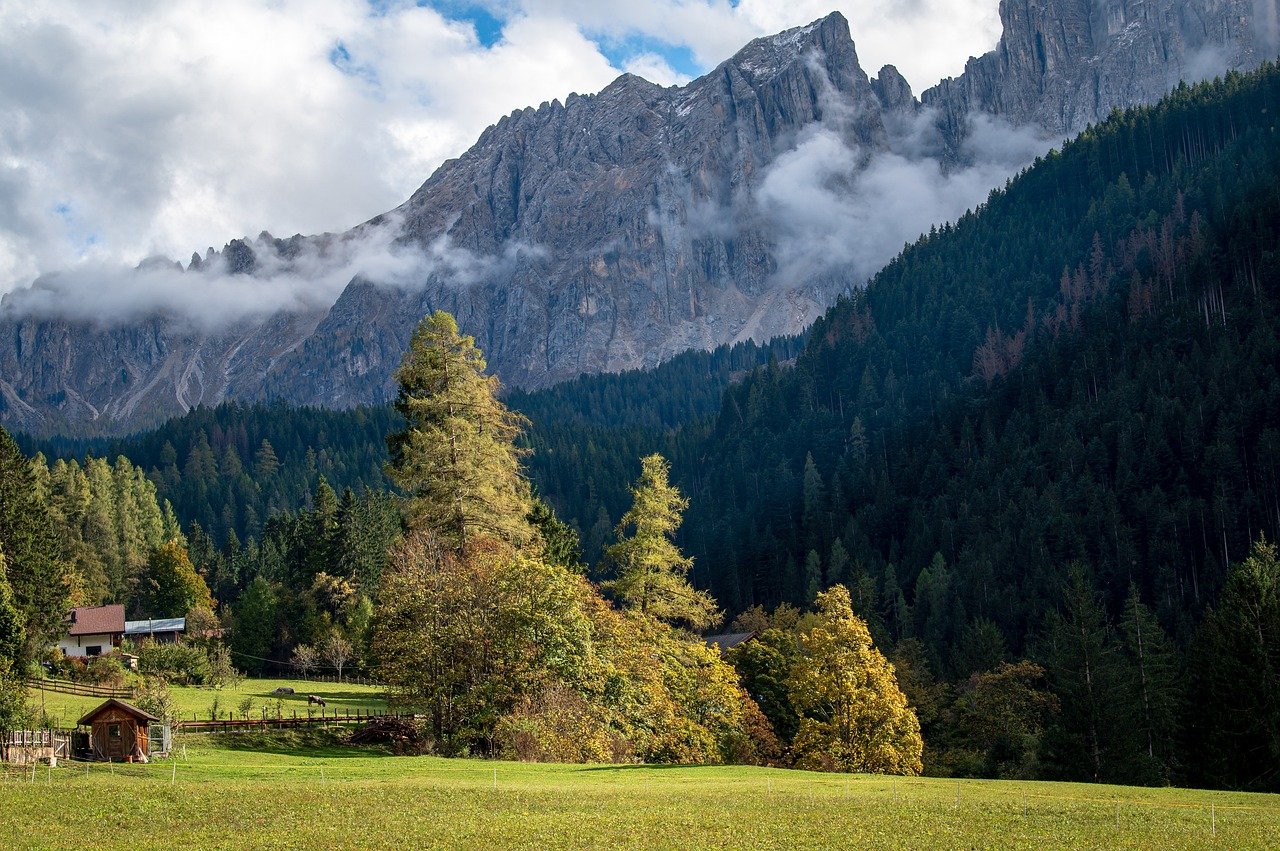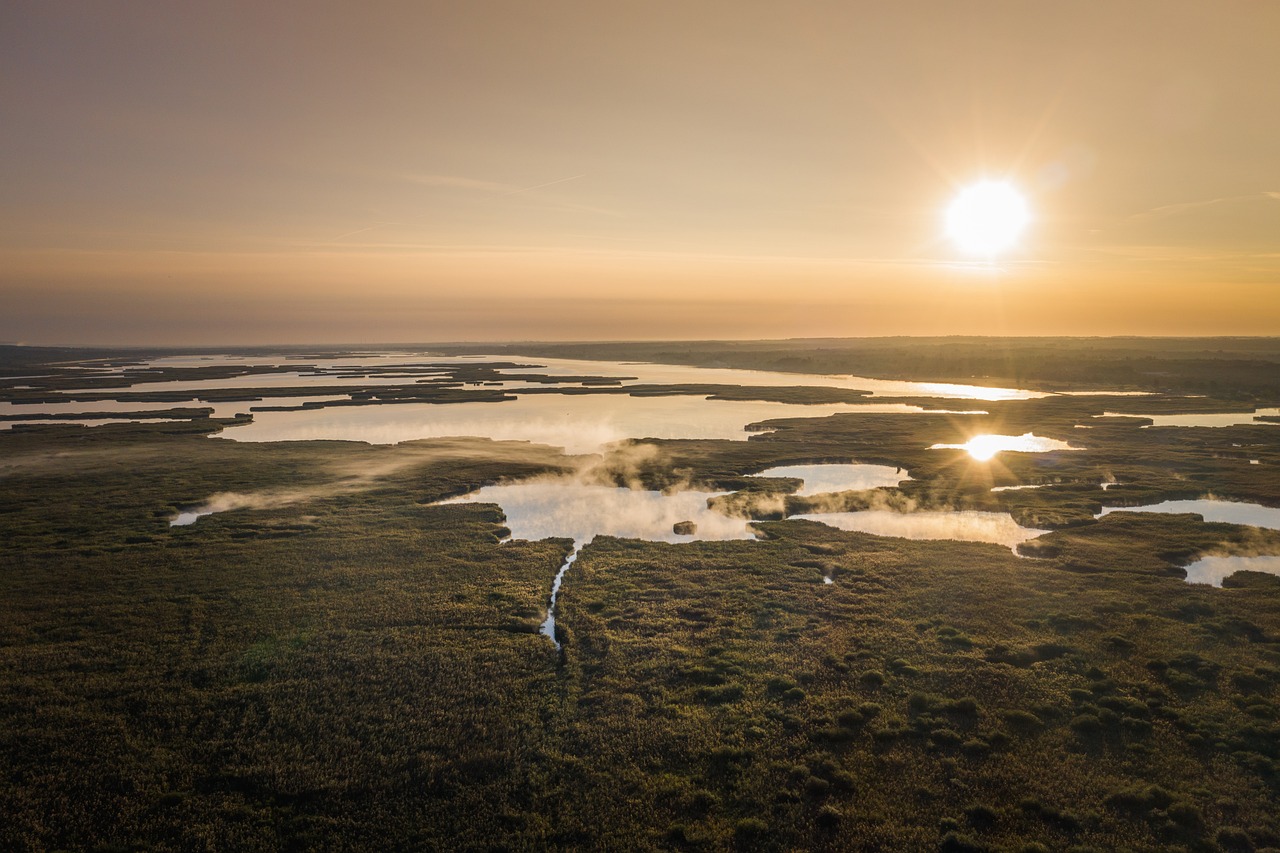What is Eco-Tourism and How can it Aid Sustainability?
Eco-tourism is more than just a travel trend; it's a movement towards responsible travel that emphasizes the conservation of nature and the well-being of local communities. Imagine stepping into a lush rainforest or lounging on a pristine beach, all while knowing that your visit is making a positive impact. Eco-tourism invites travelers to immerse themselves in the beauty of the natural world, but with a conscious effort to protect it. This approach not only enhances the experience for the traveler but also ensures that the environment and local cultures are preserved for future generations.
At its core, eco-tourism is about sustainability. It encourages visitors to respect the delicate balance of ecosystems and to engage with local cultures in a way that promotes understanding and appreciation. By prioritizing environmental conservation and community involvement, eco-tourism helps to create a sustainable model for tourism that benefits everyone involved. In fact, it can be a powerful tool for promoting sustainability on a global scale.
But how does eco-tourism actually aid sustainability? It does so by integrating principles that focus on minimal environmental impact while maximizing the socio-economic benefits for local communities. For instance, eco-tourism often involves:
- Supporting conservation efforts through funding and awareness.
- Encouraging responsible travel practices that reduce waste and pollution.
- Promoting local cultures and traditions, ensuring they are respected and preserved.
As travelers become more aware of their impact, eco-tourism offers a way to travel that aligns with their values. It transforms the travel experience from mere sightseeing to an opportunity for education and connection. By choosing eco-friendly options, travelers can contribute to the conservation of wildlife, the protection of habitats, and the empowerment of local communities. This not only enriches the travel experience but also fosters a sense of responsibility towards the planet.
In summary, eco-tourism is a vital aspect of sustainable development that encourages travelers to engage with the environment and local cultures in a respectful and meaningful way. By choosing eco-tourism, individuals can play a significant role in promoting sustainability, ensuring that the beauty of our planet is preserved for generations to come. So, the next time you plan a getaway, consider how your travel choices can make a difference. After all, every journey has the potential to be a step towards a more sustainable future!
- What is eco-tourism? Eco-tourism is responsible travel that focuses on conserving the environment and improving the well-being of local communities.
- How does eco-tourism benefit local communities? It creates jobs, supports local businesses, and provides funding for conservation projects.
- What are the principles of eco-tourism? The principles include minimal environmental impact, respect for local cultures, and support for conservation efforts.
- Can eco-tourism lead to over-tourism? Yes, if not managed properly, eco-tourism can lead to over-tourism, which can harm the very environments it aims to protect.

The Principles of Eco-Tourism
This article explores the concept of eco-tourism, its principles, benefits, and its role in promoting sustainability and environmental conservation. Discover how eco-tourism can positively impact local communities and ecosystems.
Understanding the core principles of eco-tourism is essential for promoting responsible travel. Eco-tourism is not just about visiting beautiful places; it’s about doing so in a way that respects the environment and the local cultures. The guiding principles of eco-tourism include:
- Minimizing Environmental Impact: Eco-tourism emphasizes the need to reduce our ecological footprint. This means choosing travel options that are less harmful to the environment, such as staying in eco-friendly accommodations or participating in low-impact activities.
- Supporting Local Communities: One of the key tenets of eco-tourism is to ensure that the benefits of tourism are felt by local communities. This can be achieved through fair trade practices, hiring local guides, and encouraging visitors to purchase local crafts and food.
- Conservation and Education: Eco-tourism aims to educate travelers about the importance of conserving natural resources and protecting wildlife. By raising awareness, eco-tourism fosters a sense of responsibility among visitors, encouraging them to become advocates for the environment.
- Respect for Cultural Heritage: Eco-tourism promotes the appreciation of local cultures and traditions. Travelers are encouraged to engage with the local community respectfully, learning about their customs and way of life, which helps preserve cultural heritage.
These principles work together to create a travel experience that is not only enjoyable but also sustainable. By adhering to these guidelines, eco-tourists can ensure that their adventures contribute positively to the destinations they visit.
Additionally, eco-tourism often involves collaboration with local organizations and governments to create policies that protect natural resources and promote sustainable practices. This partnership is crucial for ensuring that eco-tourism does not just provide a temporary economic boost, but instead contributes to long-term sustainability.
In summary, the principles of eco-tourism are designed to create a balance between enjoying the beauty of nature and ensuring its preservation for future generations. By embracing these principles, travelers can make a significant impact on the environments and communities they visit, fostering a sense of stewardship and responsibility.
Eco-tourism offers numerous benefits, including economic growth, conservation funding, and cultural preservation. This section discusses how eco-tourism can foster sustainable development and support local communities while protecting natural resources.
Eco-tourism can significantly boost local economies by creating jobs and generating income. This subsection explores how eco-tourism initiatives provide financial support to communities that rely on natural resources for their livelihoods.
The growth of eco-tourism leads to new employment opportunities in various sectors, including hospitality, guiding, and conservation. This section highlights the types of jobs that eco-tourism can create in local areas.
Eco-tourism encourages travelers to support local businesses, from artisans to restaurants. This subsection emphasizes the importance of spending within communities to promote sustainable economic development.
Eco-tourism plays a vital role in funding conservation projects and raising awareness about environmental issues. This section discusses how responsible travel can contribute to the preservation of biodiversity and ecosystems.
Despite its benefits, eco-tourism faces challenges that can hinder its effectiveness. This section examines the obstacles that eco-tourism must overcome to ensure sustainable practices and positive outcomes for both travelers and destinations.
Overtourism can lead to environmental degradation and cultural dilution. This subsection discusses the impact of excessive tourist numbers on eco-sensitive areas and the importance of managing visitor flows responsibly.
Finding the right balance between profit generation and conservation efforts is crucial for eco-tourism. This section explores the challenges of maintaining sustainability while ensuring financial viability for eco-tourism operators.
1. What is eco-tourism?
Eco-tourism is a responsible travel approach that focuses on visiting natural areas while conserving the environment and improving the well-being of local communities.
2. How does eco-tourism benefit the environment?
Eco-tourism helps fund conservation efforts, raises awareness about environmental issues, and encourages sustainable practices.
3. Can eco-tourism support local economies?
Yes, eco-tourism creates jobs, supports local businesses, and generates income for communities that rely on natural resources.
4. What are some challenges faced by eco-tourism?
Challenges include overtourism, balancing profit with conservation, and ensuring that benefits reach local communities.

Benefits of Eco-Tourism
Eco-tourism is more than just a trend; it's a movement that intertwines travel with responsibility, offering a multitude of benefits that extend beyond the traveler. Imagine stepping into a world where your vacation not only enriches your life but also uplifts local communities and protects the environment. This is the essence of eco-tourism. By choosing eco-friendly travel options, you can contribute to sustainable development, promote conservation, and support cultural preservation—all while enjoying breathtaking landscapes and unique experiences.
One of the most significant advantages of eco-tourism is its ability to stimulate economic growth in local communities. When travelers choose eco-friendly destinations, they often engage with local businesses, from family-owned lodges to artisanal shops. This not only creates jobs but also fosters a sense of community pride and resilience. For instance, in regions where traditional industries may be struggling, eco-tourism provides an alternative source of income, allowing locals to thrive while preserving their cultural heritage and natural surroundings.
Moreover, eco-tourism serves as a funding source for conservation efforts. Many eco-tourism initiatives allocate a portion of their profits to support environmental projects, such as wildlife protection, habitat restoration, and community education programs. This financial backing is crucial in areas where government funding may be limited. Travelers, by choosing eco-friendly options, become part of a larger effort to safeguard the planet's biodiversity. For example, in Costa Rica, eco-tourism has helped fund numerous national parks, ensuring that these natural treasures remain protected for future generations.
Beyond economic and environmental benefits, eco-tourism also promotes cultural preservation. When travelers immerse themselves in local cultures, they help keep traditions alive. Engaging with indigenous communities, participating in local festivals, and learning traditional crafts not only enrich the travel experience but also empower these communities. This cultural exchange fosters mutual respect and understanding, allowing travelers to appreciate the rich tapestry of human experience while ensuring that local customs and practices are honored and preserved.
In summary, the benefits of eco-tourism are profound and far-reaching. By choosing to travel responsibly, you are not just a tourist; you are a contributor to a sustainable future. The positive impacts on local economies, conservation efforts, and cultural heritage are just a few reasons why eco-tourism is a win-win for everyone involved. So, the next time you plan a getaway, consider how your choices can leave a lasting legacy for both the places you visit and the planet as a whole.
- What is eco-tourism? Eco-tourism is responsible travel to natural areas that conserves the environment and improves the well-being of local people.
- How does eco-tourism benefit local communities? It creates jobs, supports local businesses, and provides funding for conservation and community projects.
- Can eco-tourism really make a difference? Yes, when done responsibly, eco-tourism can lead to significant positive impacts on both the environment and local cultures.
- What should I look for in an eco-tourism operator? Look for operators that prioritize sustainability, have clear conservation policies, and support local communities.

Economic Impact on Local Communities
Eco-tourism is more than just a travel trend; it's a powerful catalyst for economic transformation in local communities. When travelers choose eco-friendly destinations, they inadvertently become part of a larger narrative that supports sustainable development. The influx of visitors creates a ripple effect, stimulating local economies and providing much-needed financial resources for communities that often rely on the land and its resources for their livelihoods.
For instance, consider a small village nestled in a lush rainforest. Before eco-tourism, the locals might have depended solely on agriculture or logging, which can be damaging to the environment. However, with the rise of eco-tourism, these communities can now offer guided tours, host visitors in eco-lodges, and sell handcrafted goods. This not only generates income but also encourages the preservation of their natural surroundings. The economic impact can be summarized in several key areas:
- Job Creation: Eco-tourism initiatives create diverse job opportunities ranging from tour guides to hospitality staff, significantly reducing unemployment rates.
- Income Diversification: By relying on eco-tourism, communities can diversify their income sources, making them less vulnerable to market fluctuations in traditional sectors.
- Investment in Infrastructure: Increased tourism often leads to better roads, healthcare, and educational facilities, benefiting the entire community.
Moreover, eco-tourism fosters a sense of pride among locals as they share their culture and heritage with visitors. This cultural exchange not only enriches the travel experience but also empowers communities to take ownership of their resources. Local artisans, for example, can showcase their crafts, leading to increased sales and recognition. The economic benefits extend beyond immediate financial gains; they lay the groundwork for long-term sustainability.
To illustrate the economic impact of eco-tourism, consider the following table that highlights some key statistics:
| Impact Area | Before Eco-Tourism | After Eco-Tourism |
|---|---|---|
| Average Annual Income | $5,000 | $12,000 |
| Employment Rate | 30% | 70% |
| Local Business Growth | 5 Businesses | 20 Businesses |
As you can see, the transformation is profound. Eco-tourism doesn't just bring money into a community; it revitalizes it. It creates a sustainable model where both the environment and the economy can thrive together. It’s like planting a tree that bears fruit; with care and nurturing, it grows strong and provides for generations.
In conclusion, the economic impact of eco-tourism on local communities is significant and multifaceted. By choosing to travel responsibly, you’re not just enjoying a beautiful destination; you're also playing a role in supporting local economies, preserving cultures, and protecting the environment. Isn’t it time we all consider the broader impact of our travel choices?
- What is eco-tourism? Eco-tourism is responsible travel to natural areas that conserves the environment and improves the well-being of local people.
- How does eco-tourism benefit local communities? It creates jobs, supports local businesses, and provides funding for conservation efforts.
- Can eco-tourism harm the environment? If not managed properly, eco-tourism can lead to overtourism and environmental degradation. Responsible practices are essential.

Job Creation in Eco-Tourism
Eco-tourism is not just a buzzword; it's a transformative force that can breathe new life into local economies. When we talk about eco-tourism, one of the most exciting aspects is its ability to create jobs. Imagine a small village nestled in the mountains, where the locals have relied on farming for generations. With the rise of eco-tourism, they can now offer guided nature walks, cultural experiences, and even workshops on traditional crafts. This shift not only diversifies their income but also empowers the community.
One of the most significant benefits of eco-tourism is the variety of employment opportunities it generates. From **hospitality** roles in eco-lodges and campsites to **guides** who lead tours through breathtaking landscapes, the potential for job creation is immense. Eco-tourism often requires a skilled workforce, which means that training programs can flourish, enhancing the skill set of local residents. This can lead to jobs such as:
- Nature Guides: Knowledgeable individuals who share their expertise about local flora and fauna.
- Hospitality Staff: Workers in eco-friendly lodges and hotels, providing guests with a unique experience.
- Conservation Workers: Individuals engaged in protecting and preserving the local environment.
- Artisans and Craft Makers: Local artists who can sell their creations to tourists, boosting their income.
Moreover, eco-tourism encourages the development of **supporting industries**. Think about it: as more tourists flock to an area, there’s a growing demand for transportation services, local restaurants, and shops selling handcrafted goods. This ripple effect creates a robust economic ecosystem where everyone benefits. Local farmers can sell their produce to restaurants, and artisans can showcase their crafts to a wider audience.
But it’s not just about the numbers; it’s about the **community spirit** that eco-tourism fosters. When locals take pride in showcasing their culture and environment, it can lead to a stronger sense of identity and purpose. This not only contributes to job creation but also enhances the overall quality of life for residents. People start to feel connected to their surroundings, which can lead to greater efforts in conservation and sustainability.
In summary, the job creation potential in eco-tourism is vast and varied. It opens doors for individuals to engage with their environment and community in meaningful ways. As we continue to embrace eco-tourism, we are not just creating jobs; we are building a sustainable future where both people and nature can thrive together.
1. What types of jobs are available in eco-tourism?
Eco-tourism offers various job opportunities, including nature guides, hospitality staff, conservation workers, and artisans. These roles allow individuals to engage with their environment and contribute to sustainable practices.
2. How does eco-tourism benefit local communities?
Eco-tourism benefits local communities by creating jobs, boosting local economies, and encouraging the preservation of cultural heritage and natural resources. It provides financial support and promotes sustainable development.
3. Can eco-tourism lead to negative impacts?
While eco-tourism has many benefits, it can also lead to challenges like overtourism, which can strain local resources and disrupt ecosystems. Responsible management is essential to mitigate these effects.
4. How can travelers ensure they are participating in responsible eco-tourism?
Travelers can ensure responsible eco-tourism by choosing certified eco-friendly operators, respecting local cultures, minimizing waste, and supporting local businesses during their travels.

Supporting Local Businesses
When you think about eco-tourism, it’s easy to get lost in the stunning landscapes and breathtaking wildlife. However, one of the most profound impacts of eco-tourism is its ability to support local businesses. Imagine stepping into a small, family-owned restaurant in the heart of a lush rainforest or purchasing handcrafted souvenirs from local artisans. This isn’t just shopping; it’s about empowering communities and ensuring that the economic benefits of tourism stay within the local area.
Eco-tourism encourages travelers to spend their money on local products and services, which directly contributes to the community's economy. From organic farms that provide fresh produce to hotels that prioritize local staff and resources, every dollar spent helps to create a ripple effect that can uplift an entire community. By choosing to eat at local eateries, stay in locally-owned accommodations, and buy from local shops, travelers are not just enjoying a unique experience; they are actively participating in the sustainability of the region.
Moreover, supporting local businesses fosters a sense of pride among community members. When visitors appreciate and invest in local culture, it instills a desire to preserve their heritage and environment. This connection between travelers and locals can lead to a more authentic experience for everyone involved. For instance, a traveler might learn traditional cooking techniques from a local chef or participate in a cultural dance, enriching their journey while also providing a platform for cultural exchange.
To further illustrate the importance of supporting local businesses, consider the following table that outlines how eco-tourism benefits various sectors:
| Local Business Sector | Economic Contribution | Community Impact |
|---|---|---|
| Restaurants | Increased sales from tourists | Job creation and cultural preservation |
| Artisans | Higher demand for handmade goods | Promotion of local crafts and traditions |
| Guiding Services | Growth in eco-tourism activities | Empowerment of local guides and educators |
In summary, the role of eco-tourism in supporting local businesses cannot be overstated. It’s not just about the money; it’s about fostering relationships, promoting sustainability, and ensuring that the beauty of natural environments is matched by the prosperity of the people who call them home. So, the next time you embark on an eco-adventure, remember that your choices can have a lasting impact on the local economy. By supporting local businesses, you’re not just a tourist; you’re a vital part of a much larger story.
- What is eco-tourism? Eco-tourism is responsible travel to natural areas that conserves the environment and improves the well-being of local people.
- How does eco-tourism benefit local communities? It creates jobs, supports local businesses, and promotes cultural preservation.
- Can eco-tourism help with conservation efforts? Yes, eco-tourism can provide funding for conservation projects and raise awareness about environmental issues.
- What challenges does eco-tourism face? Challenges include overtourism, balancing profit with conservation, and ensuring sustainable practices.

Conservation Efforts through Eco-Tourism
Eco-tourism is not just a buzzword; it represents a powerful movement toward environmental stewardship and conservation. By participating in eco-tourism, travelers contribute to the protection of natural habitats and wildlife, ensuring that these precious resources are preserved for future generations. One of the most compelling aspects of eco-tourism is its ability to fund conservation projects directly. For instance, many eco-tourism initiatives allocate a portion of their profits to local conservation efforts, creating a sustainable cycle where both nature and communities benefit.
Moreover, eco-tourism raises awareness about environmental issues among travelers. When visitors engage with local ecosystems, they often develop a deeper understanding of the challenges these areas face. This newfound knowledge can inspire them to advocate for conservation efforts, both locally and globally. Through guided tours, educational programs, and immersive experiences, eco-tourism provides a platform for sharing critical information about biodiversity and the importance of preserving it.
To illustrate the impact of eco-tourism on conservation, consider the following examples:
- Wildlife Protection: Many eco-tourism operators work closely with conservation organizations to monitor and protect endangered species. By funding anti-poaching patrols and habitat restoration projects, they help ensure the survival of these animals.
- Community Engagement: Eco-tourism encourages local communities to take an active role in conservation. By involving residents in tourism activities, they are more likely to value and protect their natural surroundings.
- Research Funding: Eco-tourism often supports scientific research by providing necessary funding and resources. This research can lead to better conservation strategies and a greater understanding of local ecosystems.
Additionally, eco-tourism promotes sustainable practices among visitors. Travelers are often encouraged to minimize their environmental impact by following guidelines that protect local wildlife and habitats. Simple actions, like staying on designated trails, using eco-friendly products, and respecting wildlife, can significantly contribute to conservation efforts. These practices not only benefit the environment but also enhance the overall experience for travelers, allowing them to connect more deeply with nature.
In conclusion, eco-tourism serves as a vital tool for conservation, creating a harmonious relationship between travelers, local communities, and the environment. By choosing eco-friendly travel options, individuals can play a part in protecting our planet while enjoying its beauty. The ripple effect of eco-tourism can lead to lasting change, making it a crucial component of sustainable development and environmental conservation.
What is eco-tourism?
Eco-tourism refers to responsible travel to natural areas that conserves the environment and improves the well-being of local people.
How does eco-tourism benefit local communities?
Eco-tourism creates jobs, supports local businesses, and provides funding for conservation projects, enhancing the economic stability of communities.
Can eco-tourism help with wildlife conservation?
Yes! Eco-tourism often funds wildlife protection initiatives and encourages local communities to participate in conservation efforts.
What are some challenges facing eco-tourism?
Challenges include overtourism, which can lead to environmental degradation, and the need to balance profit with conservation efforts.

Challenges Facing Eco-Tourism
Despite its many benefits, eco-tourism is not without its challenges. One of the most pressing issues is overtourism, which occurs when a destination attracts more visitors than it can sustainably accommodate. This influx can lead to environmental degradation, such as soil erosion, habitat loss, and increased pollution. Imagine a beautiful, pristine beach that becomes a bustling hub of activity; while it may seem like a dream vacation spot, the reality is that excessive foot traffic can destroy the delicate ecosystems that make it special. The impact of overtourism can also extend to local cultures, where the authenticity of traditions may be diluted in favor of catering to tourist expectations.
Another significant challenge is the need for a balance between profit generation and conservation efforts. Eco-tourism operators often face the dilemma of wanting to generate revenue while simultaneously ensuring that their practices do not harm the environment. For instance, a tour operator might be tempted to increase the number of tourists to maximize profits, but this could lead to overcrowding in sensitive areas, ultimately harming the very ecosystems they aim to protect. Finding this balance is crucial, as it affects both the sustainability of the eco-tourism model and the overall experience for travelers.
Moreover, the lack of education and awareness among travelers can pose a challenge. Many tourists may not fully understand the principles of eco-tourism or the impacts of their actions on the environment. For example, a visitor may unknowingly disturb wildlife or litter in a natural setting, undermining conservation efforts. Therefore, it's essential for eco-tourism operators to implement educational programs that inform tourists about their role in preserving the environment. This can include guidelines on responsible behavior, such as staying on designated paths, respecting wildlife, and minimizing waste.
Additionally, regulatory challenges can hinder the growth of eco-tourism. In many regions, there may be insufficient regulations to manage tourist activities effectively, leading to unsustainable practices. Governments and organizations must work together to establish clear guidelines that promote eco-friendly practices while also supporting the local economy. This collaboration can help ensure that eco-tourism thrives while protecting natural resources.
Lastly, the impact of climate change cannot be ignored. As weather patterns shift and natural disasters become more frequent, eco-tourism destinations may face significant challenges. For example, rising sea levels can threaten coastal attractions, while changing ecosystems can affect wildlife viewing opportunities. Eco-tourism must adapt to these changes, which may require innovative approaches to travel and conservation.
In summary, while eco-tourism presents a promising avenue for sustainable travel, it is essential to recognize and address the challenges it faces. By tackling issues like overtourism, balancing profit with conservation, educating travelers, establishing effective regulations, and adapting to climate change, we can pave the way for a more sustainable future in eco-tourism.
- What is eco-tourism? Eco-tourism refers to responsible travel to natural areas that conserves the environment and improves the well-being of local people.
- How can I practice eco-tourism? You can practice eco-tourism by choosing eco-friendly accommodations, supporting local businesses, and minimizing your environmental impact while traveling.
- What are the benefits of eco-tourism? Eco-tourism promotes conservation, supports local economies, and provides travelers with unique experiences that connect them to nature.
- What challenges does eco-tourism face? Key challenges include overtourism, balancing profit and conservation, lack of traveler education, regulatory issues, and the impact of climate change.

Overtourism and Its Consequences
Overtourism is an increasingly pressing issue in the world of travel, where the sheer number of visitors to a destination can become overwhelming. Imagine a beautiful, serene beach, once a hidden gem, now swamped with tourists snapping selfies and leaving behind litter. This scenario isn’t just a figment of imagination; it’s a reality for many popular destinations. The consequences of overtourism are profound and multifaceted, affecting not just the environment but also local communities and economies.
One of the most significant consequences of overtourism is environmental degradation. Natural habitats can be irreparably damaged by the sheer volume of foot traffic. For example, fragile ecosystems such as coral reefs and coastal areas are particularly vulnerable. When too many people visit these locations, the delicate balance of these ecosystems is disrupted, leading to issues such as soil erosion, loss of biodiversity, and pollution. In some cases, areas that were once thriving with wildlife may become barren as human activity takes its toll.
Moreover, overtourism can lead to cultural dilution. Local traditions and customs may be overshadowed by the influx of tourists seeking a specific experience. When local communities cater to the demands of visitors, they might modify their cultural practices or even commercialize them, leading to a loss of authenticity. Think about it: how genuine is a cultural experience if it’s tailored solely for tourists? This not only affects the integrity of the culture but can also alienate locals who feel their heritage is being exploited.
In addition, the economic impact of overtourism can be a double-edged sword. While tourism can bring in significant revenue, an excessive number of visitors can strain local infrastructure. Roads, public transportation, and waste management systems may become overwhelmed, leading to increased costs for local governments. This can create a situation where the very communities that rely on tourism for their livelihood find themselves struggling to cope with the consequences of their success.
To better illustrate the consequences of overtourism, consider the following table:
| Consequence | Description |
|---|---|
| Environmental Degradation | Damage to ecosystems, loss of biodiversity, and pollution. |
| Cultural Dilution | Local traditions and customs modified or commercialized for tourists. |
| Economic Strain | Overwhelmed infrastructure leading to increased costs for local governments. |
It’s clear that overtourism poses significant challenges that need to be addressed. To combat these issues, destinations must implement sustainable tourism practices that prioritize the well-being of both the environment and local communities. This includes managing visitor numbers, promoting off-peak travel, and encouraging tourists to engage in responsible behaviors. After all, as travelers, we have a responsibility to protect the places we love to visit. By being mindful of our travel choices, we can help ensure that these destinations remain beautiful and vibrant for generations to come.
- What is overtourism? Overtourism refers to the situation where a destination receives more visitors than it can sustainably handle, leading to negative impacts on the environment and local communities.
- How does overtourism affect the environment? It can lead to environmental degradation, including damage to ecosystems, pollution, and loss of biodiversity.
- What can travelers do to combat overtourism? Travelers can choose to visit less popular destinations, travel during off-peak times, and engage in responsible tourism practices.
- Why is cultural dilution a concern? Cultural dilution occurs when local customs are modified to cater to tourists, leading to a loss of authenticity and alienation of local communities.

Balancing Profit and Conservation
Finding the right balance between profit generation and conservation efforts is crucial for the success of eco-tourism. As the demand for unique travel experiences grows, many operators are faced with the challenge of maintaining their financial viability while also committing to sustainable practices. It's a tightrope walk, akin to juggling flaming torches—one wrong move, and the entire endeavor could go up in smoke.
On one hand, eco-tourism can be a lucrative business. Tourists are often willing to pay a premium for experiences that allow them to connect with nature and support local communities. However, this financial incentive can sometimes lead to practices that prioritize profit over the environment. For instance, in the rush to attract more visitors, some operators may cut corners, compromising their commitment to conservation. This is where the real challenge lies: how do we ensure that eco-tourism remains sustainable and genuinely beneficial to both the environment and local economies?
To address this challenge, eco-tourism operators must adopt a holistic approach that integrates conservation into their business models. This can be achieved through various strategies:
- Community Involvement: Engaging local communities in decision-making processes ensures that eco-tourism initiatives reflect their needs and values. This not only fosters a sense of ownership but also enhances the cultural authenticity of the experience.
- Education and Awareness: Providing travelers with information about the local ecosystem and the importance of conservation can lead to more responsible behavior. When tourists understand the impact of their actions, they are more likely to support sustainable practices.
- Transparent Practices: Operators should be transparent about their conservation efforts and how profits are being used. This builds trust with customers and encourages them to choose businesses that align with their values.
The financial aspect of eco-tourism cannot be ignored, but it should not come at the expense of the environment. A well-structured eco-tourism model can create a win-win situation where both the local community and the natural habitat thrive. For example, a portion of the profits could be reinvested into conservation projects, creating a cycle of sustainability. This not only helps protect the ecosystems that attract tourists but also enhances the overall experience for visitors.
In summary, balancing profit and conservation in eco-tourism is an ongoing challenge that requires innovation, commitment, and collaboration. By prioritizing sustainable practices and engaging with local communities, eco-tourism can evolve into a powerful tool for both economic growth and environmental preservation. The future of travel lies in our ability to harmonize these two seemingly opposing forces, ensuring that we can explore the beauty of our planet without compromising its integrity.
Q: What is eco-tourism?
A: Eco-tourism is a responsible travel approach that focuses on visiting natural areas, promoting conservation, and supporting local communities. It aims to minimize the environmental impact of tourism while enhancing the visitor experience.
Q: How does eco-tourism benefit local communities?
A: Eco-tourism can create jobs, generate income, and support local businesses. It encourages travelers to spend money within communities, fostering sustainable economic development.
Q: What are the challenges facing eco-tourism?
A: Eco-tourism faces several challenges, including overtourism, which can lead to environmental degradation, and the difficulty of balancing profit with conservation efforts.
Q: How can travelers contribute to eco-tourism?
A: Travelers can contribute by choosing eco-friendly operators, being mindful of their environmental impact, and supporting local businesses during their trips.
Frequently Asked Questions
- What is eco-tourism?
Eco-tourism is a responsible travel approach that focuses on visiting natural areas while conserving the environment and improving the well-being of local communities. It emphasizes sustainability, cultural appreciation, and minimal impact on ecosystems.
- How does eco-tourism promote sustainability?
Eco-tourism promotes sustainability by encouraging practices that protect natural resources and support local economies. Travelers engage in activities that benefit conservation efforts and help preserve biodiversity while enjoying unique experiences.
- What are the key principles of eco-tourism?
The key principles of eco-tourism include minimizing environmental impact, fostering cultural respect, supporting local economies, and providing educational experiences for travelers. These principles guide responsible travel practices and promote conservation.
- How does eco-tourism benefit local communities?
Eco-tourism benefits local communities by creating jobs, generating income, and supporting local businesses. It encourages sustainable economic development, allowing communities to thrive while preserving their natural and cultural heritage.
- What types of jobs are created through eco-tourism?
Eco-tourism creates various job opportunities, including positions in hospitality, guiding, conservation efforts, and local artisan crafts. These jobs not only provide income but also empower community members to share their culture and environment with visitors.
- How does eco-tourism contribute to conservation efforts?
Eco-tourism contributes to conservation by funding projects aimed at preserving ecosystems and wildlife. It raises awareness about environmental issues, encouraging travelers to become advocates for conservation and sustainable practices.
- What challenges does eco-tourism face?
Eco-tourism faces challenges such as overtourism, which can lead to environmental degradation, and the difficulty of balancing profit with conservation efforts. Addressing these challenges is essential for ensuring the long-term success of eco-tourism initiatives.
- What is overtourism, and why is it a concern?
Overtourism refers to the excessive number of tourists in a destination, which can harm the environment and dilute local culture. It is a concern because it can lead to overcrowding, resource depletion, and negative impacts on the very ecosystems that eco-tourism aims to protect.
- How can travelers practice responsible eco-tourism?
Travelers can practice responsible eco-tourism by choosing eco-friendly accommodations, supporting local businesses, minimizing waste, and respecting local cultures and environments. Being mindful of their impact helps ensure that eco-tourism remains sustainable.



















